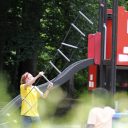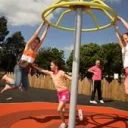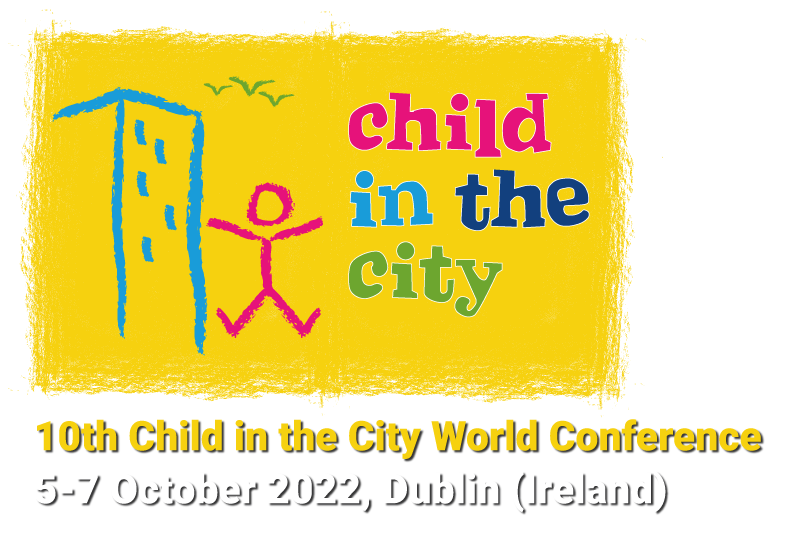Parallel Session 3.2: Participation of children and young people in policy planning and making connections between organisations
Wednesday, 5th October 16.00 – 17.30, Bedford Hall in Bedford Tower at Dublin Castle
 Grow Up and Grow Down. Why the playful child needs adult players
Grow Up and Grow Down. Why the playful child needs adult players
Anne Bakker, Stichting de Speelbasis, Netherlands
Grown ups behave quite childish nowadays. Not in the fun, creative, social manner, but in the sense of not taking responsibility and always saying it wasn’t us who ate the cookie. It is about time we dare to look in the mirror and face those facts. It’s not them, it’s us! We created a world where children aren’t playing anymore.
This statement (grow up!) fortunately leads to a perspective of love and attentiveness (grow down). Play isn’t hard or complicated. It’s about being in the moment, being present and engaged. Letting go of expectations and move and play freely. That sounds a bit vague perhaps, so we have something to guide you. Our Growing Down framework can assist Grown Ups who are ready to take responsibility, by guiding them with the language and behavior we believe will allow us to give payback to its rightful owners. Children! The child within ourselves, but much more so, those within our cities. Both who crave play so desperately.
 Growing Up Boulder: 13 Years Turning Young People’s Ideas into Action.
Growing Up Boulder: 13 Years Turning Young People’s Ideas into Action.
Mara Mintzer, Co-Founder and Executive Director of Growing Up Boulder (GUB), Boulder, Colorado, USA
Learn how Growing Up Boulder (GUB), one of the longest-running child-friendly city initiatives in the world, has turned the insights of more than 7,500 children and youth into local policy. Through strong partnerships amongst municipal governments, public schools, NGOs, and of course, children themselves, GUB has worked on more than 100 local projects in Boulder, Colorado, USA over 13 years. This presentation will provide an overview of how the program operates, how young people are engaged, and the impact of their voices on policy and place.
 Engaging with communities through a Jungk’s Future Workshop Methodology: A Froebelian way of listening
Engaging with communities through a Jungk’s Future Workshop Methodology: A Froebelian way of listening
Marlene McCormack
The views of children and families are critical to the realisation of inclusive play environments as outlined in the Dublin City Play Strategy. The benefits of local and accessible, outdoor play provision are far reaching, nourishing children’s well-being, learning and development; supporting children to build friendships, but also affording families opportunities to connect, build social networks and have a sense of belonging in their neighbourhoods. Dublin City Council in the new Pollinating Play, Dublin City Play Strategy (2021-2025), has adopted a principle of ‘play sufficiency’ and a commitment to a play-led approach in developing the city landscape for children. A Froebel-Trust funded project, which examines play environments and play opportunities for young explored the play preferences of those living in urban, marginalised communities. The research adopted Jungk’s Futures Workshop (Ollenbury, 2019) methodology to facilitate children and their parents create a vision of sustainable play within their communities. The research was conducted in two separate communities with children (2.5 – 6 years of age) and their families, and culminated in researchers bringing together educators, parents, and children from two early childhood settings to generate a vision of what play might look like in their neighbourhoods.
 Madrid, an Interconnected City Through Initiatives From the Public and Private Sector: New Social Networks
Madrid, an Interconnected City Through Initiatives From the Public and Private Sector: New Social Networks
Ana Isabel Garrido Martinez
The theme of this abstract is about the importance of neighborhood community projects in the children, teenagers, youth, adults and elderly people for the creation of most sustainable, healthy, compassionate, inclusive cities. The case study is about a neighborhood project which took an important role in the citizenship participatory processes of one municipality of Madrid, within the industrial history of the city. Its current situation after not renewing its assignment agreement on an empty space within the municipality. This space is located in an old fruit and vegetable market built during the 30’s, an important heritage building in the city of Madrid, and a very distinctive identity feature in the community. This project has had a large trajectory with a proper space and without physical space. Now it is developing new ways of keeping active and visible. Creating cultural festivals, activities, intergenerational workshops, seminars, etc using other spaces in the neighborhood as well as supporting actively other projects like the School Rebellion with the local parents, schools associations and students in the area.
